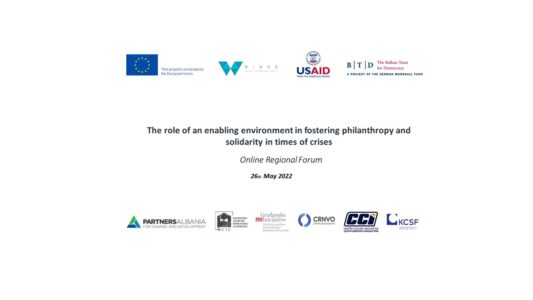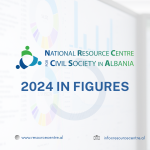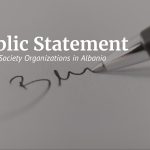Partners Albania and the National Resource Centre for Civil Society held on May 26, 2022, the regional forum “The role of an enabling environment in fostering philanthropy and solidarity in times of crises” The regional event brought together in a virtual meeting about 135 representatives from civil society organisations, networks, public institutions, businesses, and donor representatives.
The regional forum aimed to present an overview of the role of philanthropy during the pandemic time by highlighting the legal aspects of enabling such activity and sharing best practices of innovation, solidarity, and voluntarism by CSOs and companies related to the topic.
Convinced as a vital meeting on philanthropy, particularly addressing the COVID-19 crises, the discussion in the forum was organized into two main sessions. The first session “Current State of the Legal Environment of Philanthropy in Europe and Global Context” included three speeches and highlighted the importance that an enabling environment for philanthropy has in order to address the pressing needs of the society and nurture the collaborations among different stakeholders. The second session “Current State of the Legal Environment in the Western Balkans” brought into focus the current legal framework on philanthropy in Bosnia and Hercegovina, Montenegro, North Macedonia, and Serbia and the challenges faced by CSOs in this regard.
Mrs. Ariola Agolli, manager of the National Resource Centre for Civil Society in Albania emphasized in her opening remark the key role and contribution that CSOs and the private sector had in coping with and addressing the COVID-19 effects. Further on, Mrs. Agolli highlighted the importance of such events, not only in promoting good practices and cases and creating synergies among different stakeholders but also to provide policy recommendations in order to address the challenges and bottlenecks that CSOs face in philanthropy.
First Session: “Current State of the Legal Environment of Philanthropy in Europe and Global Context”
The first session was addressed by Mr. Tiziano Blasi, senior project coordinator at WINGS, Mr. James Magowan, Coordinating Director at European Community Foundation Initiative, and Mrs. Kostandina Këruti, Program Manager at Partners Albania for Change and Development.
Some of the main points concerning the Current State of the Legal Environment of philanthropy in Europe and the Global Context discussed were:
• Barriers to registration, taxation and cross–border giving are three of the main legal challenges faced at the global level by philanthropy institutions;
• Political, economic, and social-cultural environments are factors that enable or hinder the development of philanthropic activity in a country;
• Community foundations as philanthropic organizations played an important role during the COVID-19 crisis and particularly are playing a crucial role in response to the Ukraine crisis.
• In Albania activities stipulated to benefit from tax incentives are very narrow;
• The bands of tax incentives are low. They serve more as “educational” purposes rather
than incentives for companies to donate;
Recommendations:
• The philanthropic space should be expanded, growth of philanthropy should be accelerating, and strong ecosystems should be built in order to scale up the enabling environment of philanthropy;
• Solidary and cooperation are important to addressing humanitarian and pandemic crises;
• The law on sponsorship in Albania should be amended by including a wide range of activities and increasing tax incentives to businesses for philanthropy.
• There is a need to have legal regulations in place to address digital developments such as crowdfunding platforms.
Second Session: “Current State of the Legal Environment in the Western Balkans”
The second session was addressed by Mr. Vuk Vukovic, research and analysis manager at Catalyst Balkans from Serbia, Mrs. Nikica Kusikinova, director at Konekt from North Macedonia, Ms. Aida Vežić, program coordinator at Mozaik Foundation from Bosnia and Herzegovina, and, Mrs. Anica Maja Boljević, executive director of Fakt from Montenegro.
Some of the main points concerning the Current State of the Legal Environment of philanthropy in the Western Balkans were:
• Philanthropy in the region is treated more like a charity activity rather than an intervention with long-term impact.
• There is no register of official state institutions in Western Balkans that gather and monitor the trends of giving and the estimation of giving’s are mainly taken from the monitoring of media;
• During the pandemic situation of COVID-19, a vast majority of giving was given to health care.
• Two worrying trends are seen during these pandemic times: lots of the donations are channeled to public institutions to address inefficiencies of the work of the public administration and there is a decreased trend of donations towards CSOs.
• Tax relief procedures are burdensome for the donors and recipients of donations, contributing to hindering philanthropic activity.
Recommendations:
• It is crucial for the policymakers to enable tax relief and fiscal incentives for individuals and business companies
• The procedures concerning tax relief should be easy and straightforward without penalizing the donor or recipient of donations.
• More capacity-building and financial institutional support to CSOs and Support Infrastructure Organizations in order to maximize the environment of philanthropy CSOs and should have more institutional support
we need to provide institutional support to CSOs
• It is important that the media focus also on philanthropy and present data, facts, and cases that happen concerning donations
• Changes in the laws should be harmonized among each other’s, and increase active involvement of public and private institutions to advance the enabling environment for philanthropy in the Western Balkan Countries






